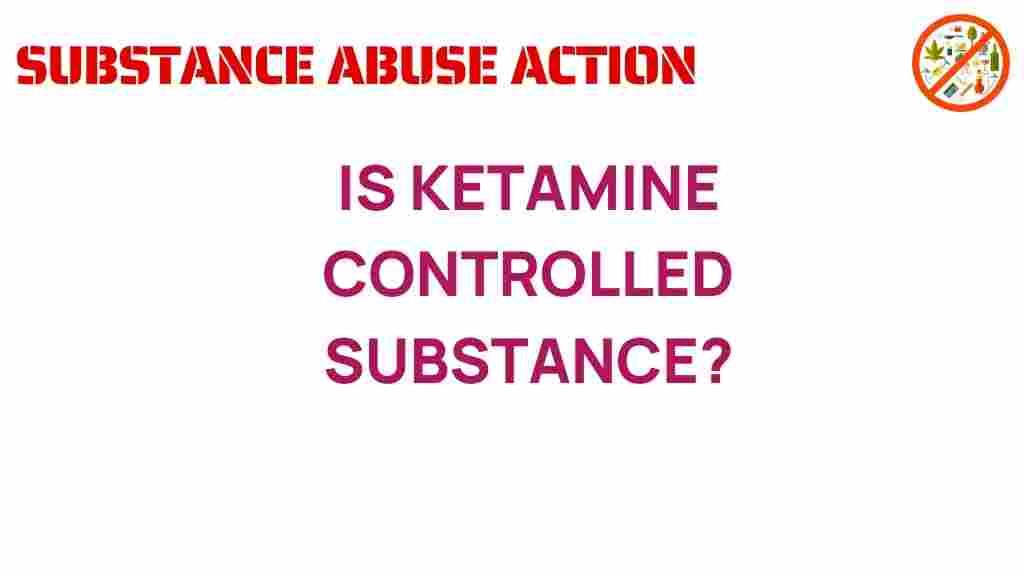Unraveling the Mystery: Is Ketamine a Controlled Substance?
In recent years, ketamine has gained attention as a promising treatment option for various mental health disorders, particularly depression and anxiety. However, questions surrounding its status as a controlled substance have sparked interest and concern among healthcare professionals, patients, and the public. In this article, we will explore the nature of ketamine, its legal status, its applications in mental health treatment, and the regulations governing its use.
What is Ketamine?
Ketamine is a dissociative anesthetic that has been used in medical settings since the 1960s. Initially developed for use in surgery, ketamine has recently been studied for its potential therapeutic effects in treating mental health conditions, particularly treatment-resistant depression. Unlike traditional antidepressants, ketamine can produce rapid effects, often within hours.
Ketamine’s Legal Status and Classification
Understanding whether ketamine is classified as a controlled substance requires delving into regulatory frameworks. In the United States, drugs are classified into schedules under the Controlled Substances Act (CSA). Ketamine is classified as a Schedule III controlled substance. This means it has accepted medical uses but also carries a potential for abuse and dependence.
Why is Ketamine Classified as a Controlled Substance?
The classification of ketamine as a controlled substance is primarily due to its potential for misuse and the risk of addiction. Although ketamine is effective in medical settings, its recreational use can lead to dissociation, hallucinations, and other adverse effects. The following factors contribute to its controlled status:
- Potential for Abuse: Ketamine can be misused for its psychoactive effects, which can lead to habitual use.
- Risk of Addiction: Although ketamine is less addictive than many other substances, its use can lead to psychological dependence.
- Medical Oversight Required: The administration of ketamine needs to be monitored by healthcare professionals to ensure safety and efficacy.
Ketamine in Mental Health Treatment
The therapeutic use of ketamine has shown promising results in treating various mental health disorders:
- Major Depressive Disorder: Ketamine has been found to produce rapid antidepressant effects, especially in individuals who do not respond to traditional medications.
- Post-Traumatic Stress Disorder (PTSD): Some studies suggest that ketamine can help alleviate PTSD symptoms, providing relief to those affected.
- Anxiety Disorders: Ketamine therapy has been explored as a treatment for anxiety-related conditions, showing positive outcomes in many cases.
The Ketamine Therapy Process
Ketamine therapy typically involves a series of treatments administered in a clinical setting. Here’s a general outline of the process:
- Initial Consultation: Patients undergo a thorough evaluation with a mental health professional to assess their history and determine if they are suitable candidates for ketamine therapy.
- Treatment Plan: If approved, a personalized treatment plan is developed, outlining the frequency and dosage of ketamine administration.
- Administration: Ketamine can be administered intravenously (IV), intranasally, or via intramuscular injections, depending on the treatment protocol.
- Monitoring: Patients are monitored for any side effects during and after the treatment session, ensuring their safety and comfort.
- Follow-Up: Regular follow-up appointments are scheduled to assess the effectiveness of the treatment and make any necessary adjustments.
Risks and Side Effects of Ketamine
While ketamine can be an effective treatment option, it is important to be aware of potential risks and side effects:
- Short-Term Effects: Some patients may experience dissociation, increased blood pressure, nausea, or sedation immediately after administration.
- Long-Term Effects: Ongoing use of ketamine can lead to bladder issues, cognitive impairments, and dependence, necessitating careful monitoring during treatment.
- Drug Interactions: Ketamine can interact with other medications, so it is crucial to inform the healthcare provider of all medications being taken.
Regulations Surrounding Ketamine Use
The use of ketamine as a controlled substance is subject to strict regulations. Healthcare providers must adhere to the following:
- Licensing: Only licensed medical professionals can administer ketamine for therapeutic purposes.
- Documentation: Detailed records must be kept regarding patient evaluations, treatments administered, and outcomes.
- Compliance: Clinics offering ketamine therapy must comply with federal and state regulations governing the use of controlled substances.
Ketamine and Addiction: Understanding the Risks
Addiction is a serious concern with any controlled substance, including ketamine. Though the risk of addiction is lower than many recreational drugs, it is essential to approach ketamine therapy with caution:
- Psychological Dependence: Some individuals may develop a psychological dependence on the dissociative effects of ketamine.
- Recreational Use: The availability of ketamine in non-medical settings increases the risk of misuse and addiction.
- Support Systems: Patients undergoing ketamine therapy should have access to support systems to address any emerging issues related to substance use.
Troubleshooting Tips for Ketamine Therapy
For those considering or undergoing ketamine therapy, here are some troubleshooting tips to ensure a positive experience:
- Open Communication: Maintain open communication with your healthcare provider about your experiences and any side effects.
- Set Realistic Expectations: Understand that while ketamine can provide rapid relief, it may not be a permanent solution and should be part of a broader treatment plan.
- Engage in Supportive Therapy: Combining ketamine therapy with talk therapy or support groups can enhance treatment effectiveness.
Conclusion
In summary, ketamine is classified as a controlled substance due to its potential for abuse and dependence, but it also holds significant promise as a treatment for mental health disorders. As regulations evolve and more research is conducted, the understanding of ketamine’s benefits and risks will continue to grow. For individuals struggling with mental health challenges, ketamine therapy may offer hope, but it is essential to approach treatment under the guidance of qualified healthcare professionals.
For more information on mental health treatments, consider visiting this resource. If you have specific questions about ketamine and its legal status, consult with a healthcare provider or legal expert familiar with drug regulations.
This article is in the category Treatment and created by SubstanceAbuseAction Team
